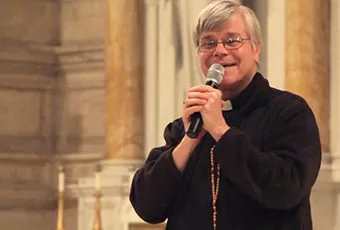
catholic blog


Noah’s Ark Discovered Documentary! Evidence for Its Location, Genesis Flood! Proof Bible Is True!
Many people today believe Noah’s Ark and the Flood are just myths or some altered version of ancient beliefs. Of all the stories in the Bible, Noah’s Ark and the Great Flood is one of the most controversial. Is it all true? Did it really happen? How did it happen? And if it’s true, is there evidence of the Flood and the existence of Noah’s Ark today? In this video, we’ll be looking at overwhelming evidence that supports the location of Noah’s Ark. We’ll also end with a faith lesson about what God would desire for us to learn from this event. I really believe this video will be life-changing and transforming to your life. https://www.youtube.com/watch?v=9f4uF4Va9gI

Mother Mary Miracle – Water Drops From Her Hand
This miracle was taken place in Uttan Bhatebandar Mata Velankanni Church, Distance between Velankanni Church Uttan and Bhayander West is 9.1 kms Its is said that the sisters were praying, that time miracle took place. https://www.youtube.com/watch?v=hMG4PFpn43I

Come as You Are to Jesus!
By Ignatian Spirituality When I was preparing for First Communion, I remember Sister telling our class that when we go to Mass, we are going before a king—the King of all Creation—so we had better be prepared and presentable. I took her words to heart, always wanting to be “prepared and presentable” when I went to Mass. I wanted to be so perfect for the King. The fact was, though, I wasn’t perfect. What’s worse, I knew I was never going to be perfect. Fast forward ten years to my first year of college. The church was full of students; it was 11 p.m.—the “last-minute Mass,” as the students fondly called it. They piled into the church, overflowing the pews out to the walls. It was the first Sunday of Lent. That evening, the Jesuit homilist spoke words that would forever change my spiritual life: “Come, come as you are, just come. Jesus is your friend; he is here for you. He is waiting for you.” The words echoed in my head for days. They cleared up the misunderstanding that had formed in my eight-year-old brain. I didn’t have to be perfect—perfectly prepared, perfectly dressed, perfectly anything—to go to Mass or to pray. I just had to go into the presence of the Lord. How freeing! This homily inaugurated a pivotal time in my spiritual journey. It also opened the door for a personal relationship with Jesus—a friendship that would grow over the years. Because, the fact is, few people are really best friends with kings. However, if I simply thought of Jesus as my friend, it would be a lot easier to go to him, even if he were a king. And, if I didn’t have to be perfect all the time, I could talk with him any time. Read more…

The End Times Prayer of the Flame of Love with Father James Blount SOLT
Father James Blount shares his testimony about the effects of the Unity Prayer in his Exorcism Ministry and what EVERYONE can do now- priests, laity, children- to blind evil and bring about the Triumph of the Immaculate Heart. https://www.youtube.com/watch?v=jR0T6pyg948

Religion Of Famous Football Players TOP 50 | Can You Guess How Many Catholics?
https://www.youtube.com/watch?v=417NO8UTK4U&t=8s


Jesus Statue Moves Its Head During Catholic Mass in Mexico!
https://www.youtube.com/watch?v=6VA7Xrkqh6A

8 Easy Steps to be a Good Catholic
1. Be a Catholic of prayer We should be Catholics of prayer. St. Augustine affirmed that prayer is the key that opens the gates of heaven and offers us all of God’s treasures. Just as bread is beneficial for the body, so also prayer is beneficial for the soul. If we do not dedicate ourselves to God and the Queen of Heaven through prayer, we will never be able to keep the Ten Commandments faithfully. 2. Always go to Mass The Holy Mass is the queen of prayers and the highest form of praise, for in it God offers himself on the Cross. When our body is weak and debilitated by some sickness, we find time to go to a doctor to be cured, don’t we? We seek adequate treatment. Well, we find at Mass He who is the doctor and remedy for souls waiting to cure our weaknesses. At Mass, the Passion of Jesus Christ is renewed upon the altar, just as at Calvary. Would we dare leave Jesus alone and suffering, and go have fun at the shopping center on a Sunday or a holy day of obligation? 3. Flee from sin: confession and Easter communion every year Queen Blanche, the mother of St. Louis IX, said, “My son, I prefer to see you dead rather than having stained yourself with mortal sin.” The pious queen’s desire so pleased God that it is said that St. Louis IX never committed a mortal sin in his life. We should pray like this and ask to avoid not only mortal sins, but to flee even from venial, sins so often committed during our lives. However, if we fall, we can go to confession, just as the prodigal son returned to his father’s house. In the Catechism, we learn that one of the commandments of the Church is the obligation of Catholics to go to confession and receive communion at least once a year at Easter. 4. Attend daily mass, when possible As Catholics, we should go to Mass on Sundays. Nevertheless, it is very profitable to visit God in His house every day if possible. Besides ordinary everyday meals for the body, we also have feasts and banquets. In a similar way for the spirit, it is beneficial to have spiritual feasts and banquets during the week besides Sunday Mass. Thus, attending daily Mass is a joyful nourishment and a powerful remedy for us. 5. Pray the Rosary daily with your family St. John Paul II tells us: “The family that prays together stays together. The Rosary is my favorite prayer. A marvelous prayer! Marvelous in its simplicity and its depth. In this prayer we repeat many times the words that the Virgin Mary heard from the Archangel, and from her kinswoman Elizabeth.” Our Lady is ready to grant our petitions! The Rosary is the means to obtain everything we need, including union in our families, the solution to our problems and even our material necessities. 6. Read a pious book and meditate frequently Pious reading is the sister of prayer and a great help for us. St. Paul recommended Timothy to do so regularly. Reading spiritual literature is so important, that when we wish to help someone who is distant from religion, we normally counsel him or her to read a religious book. Many saints affirmed that spiritual reading is a special nourishment for the soul. It produces good thoughts and desires for heaven, and frees our understanding. Pious literature inflames and enlightens our will, soothing our sadness, and causes true spiritual happiness. Now, let me ask you something: What book are you currently reading to progress spiritually? 7. You are the average of the 5 people closest to you Certainly, you have heard the saying: “You are the average of the five people closest to you.” There is another saying with a similar lesson: “Tell me who your friends are and I will tell you who you are.” If you wish to be a good Catholic, examine your companions and evaluate your five best friends… Are they the measure of what you wish to be as a good Catholic? If they are, congratulations! You will have great allies to reach your goal. If they are not, your journey on the path to sanctity may be much more difficult. 8. Have a designated confessor and spiritual director We should have a confessor and spiritual director, to whom we give an account of our conscience, our inclinations, our passions, our affections and bad habits, without hiding anything. Actually, a confessor and spiritual director are like gardeners. If we cut the roots of a bad plant or tear out a weed, they soon wither away. But, if we tear them out leaving the roots in the earth, the harmful plant soon starts growing again. So, we should have confidence in our confessor that he can help us definitively to weed out our vices and bad habits. Read more…
